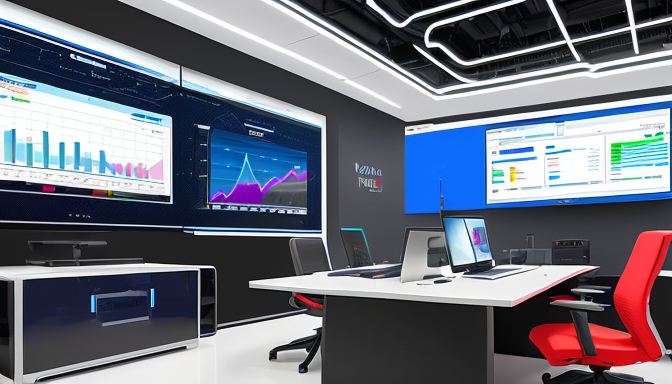In today’s fast-paced digital landscape, artificial intelligence (AI) is not just a buzzword; it’s a game-changer that is revolutionizing the way businesses connect with their customers. Imagine a world where marketing strategies are not only tailored to individual preferences but also evolve in real-time based on consumer behavior. This is the power of AI! With its ability to analyze vast amounts of data swiftly, AI helps marketers understand their audience like never before. It’s like having a personal assistant who knows exactly what your customers want before they even realize it themselves.
As we delve deeper into the transformative impact of AI, we discover a plethora of breakthroughs and applications that are shaping our digital future. From predictive analytics that forecast trends to chatbots that provide instant customer service, the possibilities are endless. Businesses leveraging these AI tools are not only enhancing personalization but also improving efficiency. Picture this: a marketing campaign that automatically adjusts its messaging based on user interaction—sounds futuristic, right? But it’s happening now!
Moreover, AI is streamlining processes, allowing marketers to focus on creativity and strategy instead of getting bogged down by tedious tasks. This shift is crucial in an era where time is money. By embracing AI, companies are setting themselves up for success, ensuring they remain competitive in the ever-evolving market. So, are you ready to explore the exciting world of AI in digital marketing? The future is bright, and it’s just getting started!
The Role of AI in Personalization
In today’s fast-paced digital world, personalization is no longer just a luxury; it’s a necessity. Imagine walking into a store where every product seems tailored just for you—that’s the power of AI in personalization! With advanced algorithms and machine learning, AI technologies can meticulously analyze consumer behavior and preferences, allowing businesses to deliver highly relevant content and recommendations. This not only enhances customer engagement but also boosts satisfaction and loyalty.
Think about it: when you receive suggestions that align perfectly with your interests, it feels like the brand truly understands you. AI systems can track your online activities, from the websites you visit to the items you add to your cart, creating a detailed profile that informs future interactions. This level of insight enables marketers to create tailored experiences that resonate with individual customers. For example, if you frequently browse for fitness gear, AI can prioritize showing you the latest workout apparel or health supplements in your feed.
Moreover, the breakthroughs in AI applications are reshaping how brands communicate with their audience. Consider the use of chatbots powered by AI; they can engage customers in real-time, providing personalized responses that enhance the shopping experience. This not only saves time but also fosters a sense of connection between the consumer and the brand.
In essence, the role of AI in personalization is about creating meaningful interactions. As technology continues to evolve, the possibilities for personalized marketing will expand, making it an exciting time for both businesses and consumers.

Efficiency and Automation in Marketing
In today’s fast-paced digital landscape, efficiency and automation have become the lifeblood of successful marketing strategies. With the advent of AI, marketers are no longer bogged down by repetitive tasks. Instead, they can focus on what truly matters: crafting compelling messages that resonate with their audience. Imagine a world where your marketing campaigns run smoothly without constant oversight—sounds like a dream, right? Well, that dream is now a reality thanks to AI technologies!
AI tools can automate various aspects of marketing, from email campaigns to social media management. For instance, platforms like Mailchimp and Hootsuite utilize AI algorithms to optimize send times and content, ensuring that your message hits the inbox when your audience is most likely to engage. The result? Higher open rates and increased conversions!
Moreover, AI’s ability to analyze vast amounts of data in real-time allows marketers to make informed decisions quickly. Consider the following benefits:
- Data-Driven Insights: AI analyzes customer interactions and preferences, providing insights that help refine marketing strategies.
- Resource Allocation: By automating routine tasks, teams can allocate their time and resources to more creative and strategic initiatives.
- Enhanced Performance: AI continuously learns from past campaigns, improving performance metrics with every iteration.
In conclusion, embracing AI in marketing isn’t just about keeping up with trends; it’s about transforming your approach to efficiency and automation. As we move forward, those who harness the power of AI will undoubtedly lead the charge in creating more effective, engaging, and personalized marketing experiences.
Frequently Asked Questions
- How does AI enhance personalization in digital marketing?
AI analyzes vast amounts of consumer data to understand preferences and behaviors. It allows marketers to create tailored content and recommendations, making customers feel valued and improving their overall experience.
- What are the main benefits of using AI for marketing automation?
AI streamlines repetitive tasks, such as data analysis and campaign management. This not only saves time but also boosts efficiency, allowing marketers to focus on creative strategies while achieving better results.
- Can small businesses benefit from AI in their marketing efforts?
Absolutely! AI tools are accessible and affordable for small businesses. They can leverage AI to optimize their marketing strategies, improve customer engagement, and compete effectively in the digital landscape.
- Is AI in digital marketing just a trend?
Not at all! AI is reshaping the marketing landscape and is here to stay. As technology evolves, its integration into marketing strategies will only deepen, making it essential for businesses to adapt.